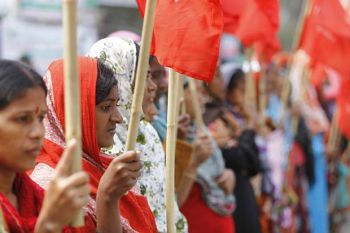Report calls on global apparel brands to fund compensation schemes for garment factory workers
By: Anna Ford
Last updated: Tuesday, 15 May 2018

Five years on from the Rana Plaza tragedy, garment workers still do not have compensation rights
Five years after the Rana Plaza garment factory tragedy, clothes factory workers still do not have the right to compensation for death or injury. That right is still reliant on voluntary donations, which are fuelled by media pressure.
In April 2013 the eight-story Rana Plaza building outside Dhaka, Bangladesh collapsed, killing more than 1,100 people and injuring thousands of others. At the time, the building housed five garment factories that manufactured goods for major retail companies in Europe and North America.
Today (Wednesday 14 March), a new report from the University of Sussex, titled Workers’ Right to Compensation after Garment Factory Disasters: Making Rights a Reality, is being launched at the Sedex conference, London.
Authored by Dr Rebecca Prentice, an expert in global garment factory health and safety from the University of Sussex’s School of Global Studies, the report calls for changes that are needed to secure compensation of workers as a right, rather than as a form of charity.
Commissioned by C&A Foundation, an organisation with a mandate to reform the fashion industry, the report compares and draws lessons from schemes to pay compensation to injured workers and dependents of those killed in the recent Ali Enterprises, Tazreen and Rana Plaza garment factory disasters. It urges global apparel brands and the governments of the countries in which they have headquarters, to protect the rights of garment factory workers and their families, to national injury and death compensation policies.
Dr Prentice commented: “Compensation for occupational injury or death is an important labour right, but it is too often denied to the survivors of garment factory disasters. This report calls for national employment injury insurance in garment-producing countries, giving practical recommendations for industry, government, and labour rights advocates. When these efforts fail, workers suffer. Therefore, global apparel companies must work now with industry stakeholders to develop and fund fair and systematic compensation schemes for workers and their dependents.
“Guaranteed compensation is an important piece of the puzzle that includes fair pay and fair working conditions.”
Report recommendations include:
- International Labour Organisation’s (ILO) Convention No. 121 provides an internationally recognised standard for delivering compensation to workers and families harmed by factory disasters, which ideally should be provided by a national employment injury insurance system.
- In the absence of such a system, the Rana Plaza Arrangement, Tazreen Claims Administration Trust and Ali Enterprises Compensation Arrangement demonstrate that it is possible to implement a voluntary, rights-based, multi-stakeholder compensation scheme after a garment factory disaster.
- However, at the heart of these post facto schemes lies a contradiction: while benefits are calculated based on workers’ internationally recognised rights to compensation, the funding to uphold those rights comes from voluntary donations.
- Governments of garment-producing countries, global apparel companies, labour rights groups and employers’ associations should make use of the experiences of recent compensation schemes to develop sustainable, comprehensive and rights-based national employment injury insurance systems which meet ILO standards.
- In the absence of national employment injury insurance, suppliers can purchase private injury insurance.
- In the regrettable circumstance that a garment factory disaster occurs where there is no employment injury insurance, post facto compensation schemes should follow a set of guiding principles: a single approach, rights-based benefits, respecting national sovereignty, multi-stakeholder cooperation, voluntary donations, engaging with the survivors, and transparency.
Dr Mojtaba Kazazi, the Executive Commissioner for Rana Plaza and Tazreen compensation schemes, said: “This report distils the material issues from three vast and complex compensation programmes, providing a template for possible future use in similar situations. I commend the report’s positive tone and approach and agree with its conclusions.”
Ben Vanpeperstraete, Lobby and Advocacy Coordinator of the Clean Clothes Campaign, added: "This report clearly shows how a new model to ensure the right to payment for loss of income to workers after supply chain incidents is emerging.
"It highlights the need to gather all stakeholders to define proper remedy solutions, and specifically the role of brands to ensure financing. At the same time, it shows how individual schemes can, and should, lead to more structural national employment injury insurance in garment producing countries, which would also cover less widely reported cases.
"In the last five years many Bangladeshi workers have fallen through the cracks of the system - a bridging solution is needed to fill the gap between these individual cases and the start of a national scheme."
The full report can be read here.
